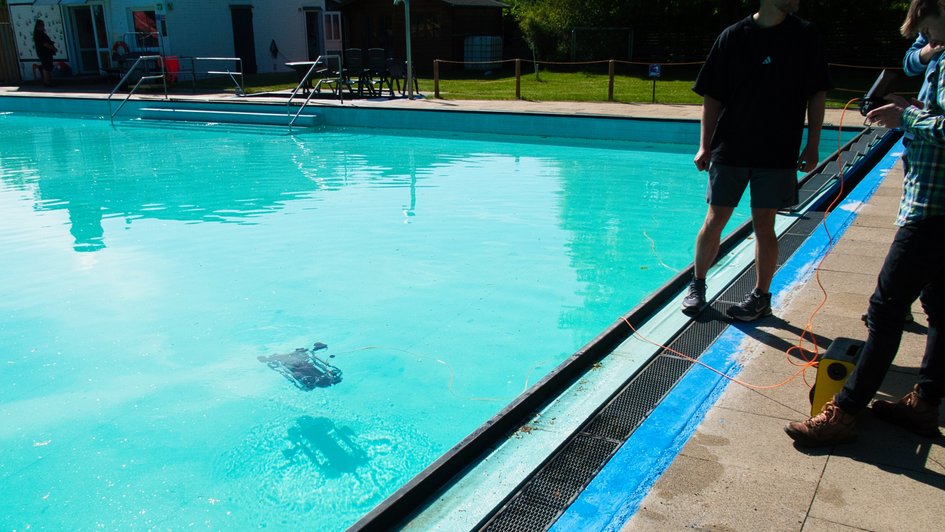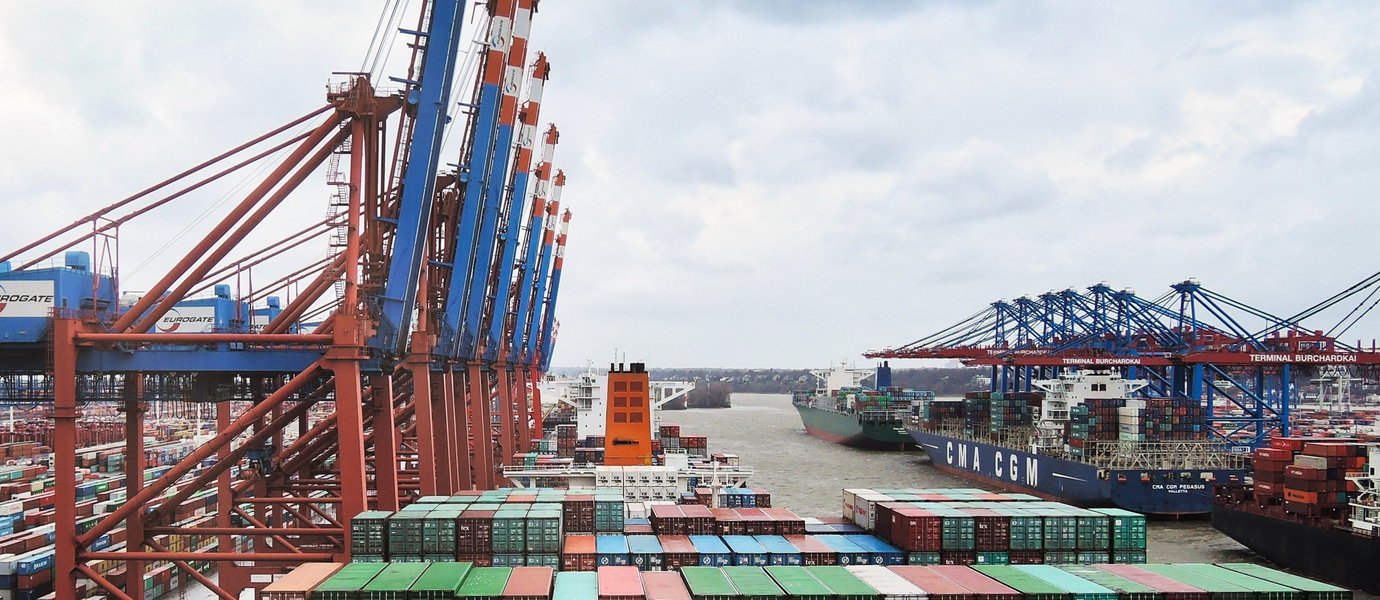Watermanagement in Global Change
Sustainable solutions are crucial to protect local and global water resources. Become part of the solution!
The water industry is facing major challenges. Climate change is causing changes in precipitation patterns and extreme weather, demographic developments are leading to increasing water demand and migration effects, and globalisation is influencing transport, trade and resource prices - including water resources. Sustainable solutions are crucial in order to protect local and global water resources. The water industry must adapt, find innovative solutions and raise social awareness.
Facts at a glance
Think globally. Study locally.
Become a sought-after specialist in hydraulic engineering. Study the Master's degree programme "Water Management in Global Change" at the Suderburg campus!
To the application (external link, opens in a new window)Water management in global change - networked thinking!
Your cookie settings have blocked this video.
Details of the degree programme
Fields of activity
Planning and implementation of projects in water management and environmental protection as well as authorisation, planning and implementation of measures in hydraulic engineering, flood protection and renaturation.
Planning and implementation of maintenance measures for watercourses, dykes, sewerage systems, sewage treatment plants and dams.
Development and planning of new ideas for sustainable water management.
Employer
- Engineering/planning offices, construction companies, public administration
- Water associations, water supply and disposal companies
- Research, e.g. at universities
Programme content
Study programme and course content
You choose specialisations that serve your interests and the desired subject specialisation.
You can find the full programme content in the study plan and in the module handbooks for the compulsory modules (PDF, 484.57 KB) (opens in a new window), (not accessible) and electives (PDF, 453.08 KB) (opens in a new window), (not accessible). Study contents include:
- Climatology and global change and environmental impact
- Project management and international contract law
- Environmental economics, development/social policy
- Compulsory elective modules: including hydraulic engineering, harbour construction, urban drainage, coastal zone management, waste technology (selection from at least 14 options)
- Field research project as part of the Master's thesis
Practical learning
In the Master's programme, you already have an academic degree. While some modules may have seemed a little detached during your Bachelor's degree, you will now work on the global context, learn to think and work in a networked way and deepen your knowledge of areas from the Water and Soil Management (Environmental Engineering) or Civil Engineering degree programmes with a focus on hydraulic and civil engineering.
This will be supported by a variety of excursions, field work or even working on one of our research projects.

Study with practical experience or part-time
The structure of the Master's degree programme in Water Management in Global Change allows you to work part-time (approx. 50%) in a company. You also have the opportunity to use your knowledge as a research assistant in various research projects at the faculty.
Your cookie settings have blocked this video.
Admission requirements
- completed Bachelor's degree (at least 7 semesters or 210 credit points) in Civil Engineering, Water and Soil Management, Environmental Engineering, Water Management or an equivalent qualification
- missing credit points (max. 30) from the Bachelor's programme of the faculty can be made up until admission to the Master's thesis
- Let us advise you and put together your Master's programme.
Contact for questions about the Master's programme
Prof. Dr.-Ing. Klaus Ruben Nelting
Prüfungsvorsitzender Masterstudiengang, Faculty of Civil and Environmental Engineering
Building C, Room C 9, Suderburg
Professor für
• Siedlungswasserwirtschaft (Abwasserbehandlung)
• Verfahrenstechnik
• Umwelttechnologie
• Biogas
• Wasserversorgung

Study plan
1. Semester 1.1 Climatology for engineers (1. Semester) As part of the "Climatology for Engineers" module, students acquire in-depth knowledge of the components and mechanisms of climate formation, global climate zones and regional climate phenomena and recognise possible causes of climate change. They recognise the various influences on climate formation and learn to assess these with regard to engineering and engineering-related issues. They will also be able to classify the possibilities and accuracy of modelling. Students will be able to assess the current state of knowledge in climate research and understand the sensitivity of the climate system to both natural and anthropogenic influences.
1.2 Global change and environmental impact (1. Semester) After successfully completing this module, students will be able to describe the recognisable anthropogenic and natural influences on global change and classify the effects of this change in the different regions of the world. They will be able to select mitigation and adaptation strategies for different regions, recognise interactions between global change and the availability and use of natural resources and analyse and evaluate possible scientific and technical solutions.
Compulsory elective modules (WPF) 1 - 4 (1. Semester) Choice of four modules (5 ECS each) from the course catalogue:
- Integrated Coastal Zone Management
- Hydraulic Engineering
- Urban drainage
- Sustainable irrigation in agriculture
- Modelling in urban water management
- Innovative urban water management systems
- Protection of water resources and treatment
- Harbour construction / offshore
- Disaster management in water management
- Engineering work in water boards
- Specialised civil engineering
- Waste technology
- Current topics or project studies
1.1 Climatology for engineers (1. Semester) As part of the "Climatology for Engineers" module, students acquire in-depth knowledge of the components and mechanisms of climate formation, global climate zones and regional climate phenomena and recognise possible causes of climate change. They recognise the various influences on climate formation and learn to assess these with regard to engineering and engineering-related issues. They will also be able to classify the possibilities and accuracy of modelling. Students will be able to assess the current state of knowledge in climate research and understand the sensitivity of the climate system to both natural and anthropogenic influences.
As part of the "Climatology for Engineers" module, students acquire in-depth knowledge of the components and mechanisms of climate formation, global climate zones and regional climate phenomena and recognise possible causes of climate change. They recognise the various influences on climate formation and learn to assess these with regard to engineering and engineering-related issues. They will also be able to classify the possibilities and accuracy of modelling. Students will be able to assess the current state of knowledge in climate research and understand the sensitivity of the climate system to both natural and anthropogenic influences.
1.2 Global change and environmental impact (1. Semester) After successfully completing this module, students will be able to describe the recognisable anthropogenic and natural influences on global change and classify the effects of this change in the different regions of the world. They will be able to select mitigation and adaptation strategies for different regions, recognise interactions between global change and the availability and use of natural resources and analyse and evaluate possible scientific and technical solutions.
After successfully completing this module, students will be able to describe the recognisable anthropogenic and natural influences on global change and classify the effects of this change in the different regions of the world. They will be able to select mitigation and adaptation strategies for different regions, recognise interactions between global change and the availability and use of natural resources and analyse and evaluate possible scientific and technical solutions.
Compulsory elective modules (WPF) 1 - 4 (1. Semester) Choice of four modules (5 ECS each) from the course catalogue:
- Integrated Coastal Zone Management
- Hydraulic Engineering
- Urban drainage
- Sustainable irrigation in agriculture
- Modelling in urban water management
- Innovative urban water management systems
- Protection of water resources and treatment
- Harbour construction / offshore
- Disaster management in water management
- Engineering work in water boards
- Specialised civil engineering
- Waste technology
- Current topics or project studies
Choice of four modules (5 ECS each) from the course catalogue:
- Integrated Coastal Zone Management
- Hydraulic Engineering
- Urban drainage
- Sustainable irrigation in agriculture
- Modelling in urban water management
- Innovative urban water management systems
- Protection of water resources and treatment
- Harbour construction / offshore
- Disaster management in water management
- Engineering work in water boards
- Specialised civil engineering
- Waste technology
- Current topics or project studies
5 reasons to study Water and Soil Management (Environmental Engineering)
- 1.
-
Actively tackling global challenges
Climate change, population growth and urbanisation are changing the demand for water worldwide - as an expert, you will design sustainable solutions for a future-proof water supply.
- 2.
-
Interdisciplinary work
The Master's programme prepares you optimally for exciting jobs in research, companies or NGOs - often with a global reach.
- 3.
-
Future-proof career prospects
Specialists in sustainable water management are in high demand - both in Germany and internationally, from authorities, engineering offices, public institutions and development organisations.
- 4.
-
Experience practical applied research
You will have the opportunity to participate in current research projects - and gain valuable experience at the interface between science and practice.
- 5.
-
Study programme with practical experience (work-study programme)
Also possible as a degree programme with practical involvement with a partner company (work-study programme).
